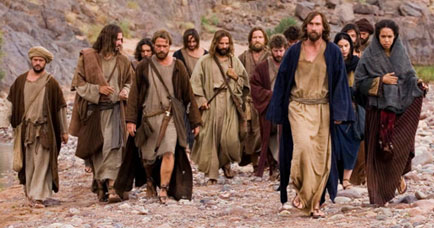Thursday after Ash Wednesday at Mississippi Abbey
Scripture Readings: Dt 30:15-20; Lk 9:22-25
 Jesus is on His way to Jerusalem. He is intentionally going there. He is not wandering. He is highly focused and goal-directed. That is important to know.
Jesus is on His way to Jerusalem. He is intentionally going there. He is not wandering. He is highly focused and goal-directed. That is important to know.
And so to those accompanying Him the trip is a long lesson on discipleship if they want to follow Him. Perhaps as a “Practicum,” He sends them out on mission to preach the good news and heal others. They come back successful. He then feeds 5,000 people.
He continues on to Jerusalem where He knows He will be put to a tortuous death. His disciples do not know what awaits Him in Jerusalem. Nor do they know what awaits them if they want to follow Him. The people who follow Moses do not know what awaits them if they continue to follow him into the Promised Land. All that Moses and Jesus know is that they are headed toward God; that constitutes them. Around that they “get it together.”
 What awaits them and us is a life lived FOR. It is life lived for, and even given, for the sake of God and others. For a people whose perception is tainted by the self-centeredness of Original Sin, that’s bad news! Yet if one has had enough of living in self-centered fear, of promoting self, but finds being fed up is not enough to stop it, she becomes convinced of the need to be free. And for that she knows she needs grace. She becomes convinced that she wants grace, and is willing to receive it.
What awaits them and us is a life lived FOR. It is life lived for, and even given, for the sake of God and others. For a people whose perception is tainted by the self-centeredness of Original Sin, that’s bad news! Yet if one has had enough of living in self-centered fear, of promoting self, but finds being fed up is not enough to stop it, she becomes convinced of the need to be free. And for that she knows she needs grace. She becomes convinced that she wants grace, and is willing to receive it.
What is the condition for receiving this grace and living this kind of life? What is the condition for becoming a disciple of Jesus Christ? It is that we leave everything. Everything. It is that we be willing to suffer, that in adversity we “let it be.” It is to accept rejection. It is to be completely dependent on God, rather than personal cleverness. It is to “keep your eye on the one who can do you good.” It takes faith.
At this point it is helpful to remember that Jesus is talking to a community. It takes a community to have this kind of faith. Shortly after this teaching He is supported by the community of Moses and Elijah at the Transfiguration. This freedom from the bondage of self to be “for” requires the example and support of a community and being “for” should make one a part of a community. If it does not, one has not found her community. Jesus had apparently not found His community among the Israelites.
 Anticipating His rejection, He said, “Whoever wishes to save his life will lose it, whoever loses his life for my sake will save it.” He will demonstrate the deadly earnestness of this when He hangs on the cross and is taunted, “If you are the Christ, save yourself!”
Anticipating His rejection, He said, “Whoever wishes to save his life will lose it, whoever loses his life for my sake will save it.” He will demonstrate the deadly earnestness of this when He hangs on the cross and is taunted, “If you are the Christ, save yourself!”
It has been said, “An unexamined life is not worth living.” We must examine what our lives are lived “for the sake of”. Is it for personal satisfaction or for that which is important-in-itself? The ability to be honest with oneself is important here. In the light of His description of discipleship, Jesus poses this question: “What profit is it to gain the whole world yet lose oneself?” More simply put, “What matters most?”
